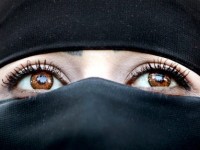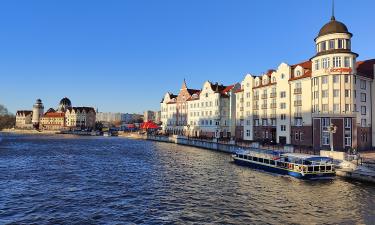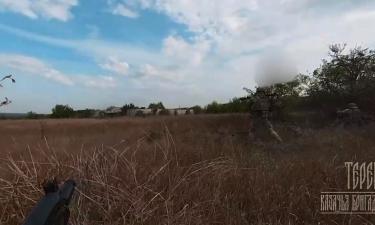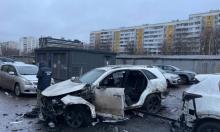Amra Babic: First mayor in hijab
The recent elections of local authorities in Bosnia-Herzegovina have revealed that the small country in the Balkans is still torn by religious and ethnic disagreements between the Muslim, Catholic Croat and Serb Orthodox communities. Arab media are trumpeting the victory of "the first mayor in Europe in a hijab." However, the main conclusions are quite different.
The victory of Amra Babic did not cause any excitement in the local media, but was picked up in Iran, Pakistan and Saudi Arabia. The 43-year-old female candidate secured the votes of the 40,000-resident town of Visoko. Babic is a member of the Party of Democratic Action (PDA), established by former President Alija Izetbegovic, the one who during the Bosnian war of 1992-1995 slaughtered entire Serbian villages, and in 1993 granted citizenship to Osama bin Laden.

Bosnia and Herzegovina was one of the six republics of Yugoslavia. Under the current constitution and the Dayton Peace Agreement of 1995, the state consists of two entities - the Federation of Bosnia and Herzegovina (Muslim-Croat) and the Republika Srpska. Bosnia and Herzegovina remains one of the few countries in the world that does not have the lyrics for their national anthem. Each of the nations (Serbs, Croats and Bosnians) sings their own.
The results of the local elections showed that the wounds of war have not yet healed. The voting is based on ethnicity, although all candidates promised economic reforms. Muslims are the largest religious group in Bosnia and Herzegovina, accounting for nearly 40 percent of the 3.8 million-strong population. Orthodox Bosnian Serbs account for 31 percent, and traditional Catholics - 10 percent. Bosnian Muslims are Sunni Slavs of Hanafi School, introduced in the Balkans in the 15th century, in the Ottoman period.
According to the preliminary data of the local election committee, PDA won the local elections in 34 municipalities of 125 (in the last election they won 37). Among them are large cities like Novi Grad, Ilica, Zenica, Bihac, and Travnik. Babic said she was very pleased that the leadership of the party had the strength and the will to support her, a woman, as a candidate for such a high office. She noted that the respect for the hijab in Bosnia should be an example for Europe. Babic told the agency France Press this was a model for Europe and beyond.
However, in Bosnia, the battle for the title of mayor between a Serb Kochevic and a Muslim Durakovic in the town of Srebrenica located in the Republic of Srpska and infamous as a place of "genocide of Muslims" in 1992, deserves more attention. According to recent reports, Durakovic is leading with a very small margin. In this predominantly Serbian town a Serb has not been able to win for 12 years because of the lack of unity in the Serbian political parties. A local resident told "Vatican Radio" that if a Serb wins, it will be very difficult for the Muslims to live here and not many will stay in the area.
In socialist Yugoslavia there was a ban on hijab, and the majority of women in Bosnia do not cover their heads, yet the new political leader emphasizes the fact that she does. She admitted that this was not a political act. Babic is deeply religious and her faith helped her to survive the loss of her husband. "I will never abuse religion in politics. If I have the power to protect my rights, I will find the strength to protect the rights of others", explained Babic who is not new to politics (she served as head of the Ministry of Finance of Bosnia and Herzegovina).
Back to the elections results. If the PDA has maintained its position, the success of the Serbian Democratic Party (SDP), whose former head, Bosnian Serb Radovan Karadzic, is indicted by the International Tribunal in The Hague for war crimes, can be called sensational. SDP won the elections in 27 municipalities, increasing its representation twofold. The other Serbian party, "The Alliance of Independent Social Democrats", led by President of the Republic of Srpska, Milorad Dodik, won in only 18 municipalities. This is a serious defeat for the party that previously controlled 32 municipalities.
Could that be that Dodik's plan for Republika Srpska to secede from the Federation is no longer supported by the Bosnian Serbs, and they want their state to be functional? Or maybe the current government represented by the President of Serbia, Tomislav Nikolic, will not play well with the separatist Dudik, preferring the party whose slogan "Three Bosnias in one." This is the opinion of an analyst from the city of Banja Luka in Republika Srpska, Tanya Topic.
Bosnia is not an example of Islamophobic sentiments in Europe; therefore, the media representation in Muslim countries is of propagandist nature. In France, which is home to 6 million Muslims, such an event would be revealing. Former President Sarkozy banned wearing of hijab in schools and hiding faces behind the veil in public places. The controversy around the decision will not subside.
Hijab has become a symbol of Islam's global expansion. Mandatory in Saudi Arabia, it is considered unacceptable in Western countries, where professional and secular sphere must be free and neutral of religion.
There are heated discussions about hijab in the Islamic world as well. Iranian news agency Mehr spread information that Mullah Hojatoleslam Ali Beheshti, a senior official in the Iranian city of Shahmirzad, was beaten and taken to hospital after he approached two women in the street and ordered them to wear the hijab. The mullah said that the women hit him with their fists and feet, and when he regained consciousness, they were going to throw him in a canal.
Iranian theologian Kadivar said that there is a recommendation to wear the hijab in the Koran, but there is no mention of the penalties for refusing to do it. Kadivar said that there were no verses in the Koran that give anyone the right to take action against those who do not wear the hijab.
Lyuba Lulko
Pravda.Ru
Subscribe to Pravda.Ru Telegram channel, Facebook, RSS!




